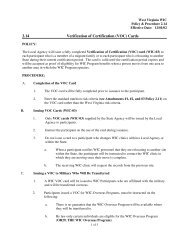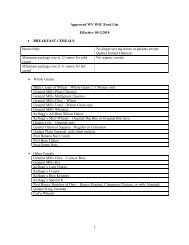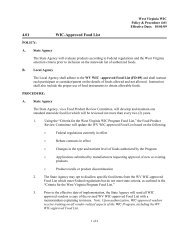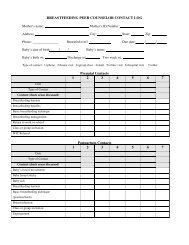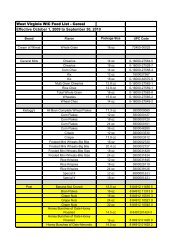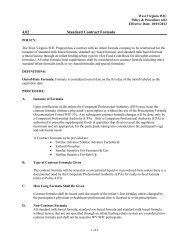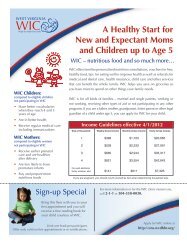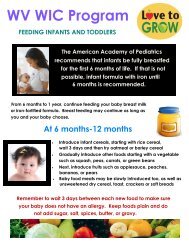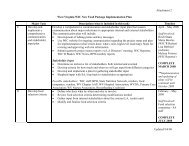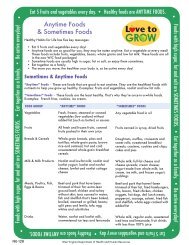adequate magnesium. The foods that are well-known to be rich in potassium (e.g. potatoes,milk, bananas, orange juice, etc.) do not happen to be rich in magnesium.The best foods sources <strong>of</strong> magnesium are the part <strong>of</strong> the plant that will be “the babyplant” … that is, the part that is a seed, bean, germ, or nut. Increasing intake <strong>of</strong> these foods canbe very helpful for many health reasons. This includes, for example, decreasing risk <strong>of</strong>developing Type II diabetes, and improving management <strong>of</strong> diabetes if it is already established.The fairly recent recognition <strong>of</strong> these foods as the best magnesium sources and the importance <strong>of</strong>magnesium adequacy is a main reason why “whole grains” … the kind that still have the germincluded … and eating nuts are being encouraged.Most multivitamins contain 0- 25% <strong>of</strong> the recommended magnesium intake. (Mostcontain zero potassium, by the way.) For people not on furosemide, the amount <strong>of</strong> magnesiumprovided in a multivitamin may be sufficient if food magnesium sources are generally good.However, it is unlikely to be sufficient if furosemide is in the picture as well.In this context, supplementation <strong>of</strong> a separate magnesium oxide or magnesium chloride toprovide about 400 mg/day more is a good idea for people on this medication, unless the personhas poorly functioning kidneys. Four hundred is just the usual recommended amount for healthypeople and readily available over the counter … it is not a high “therapeutic” level. [Note thatmagnesium sulfate and magnesium citrate are poorly absorbed sources <strong>of</strong> magnesium, and theycontribute to loose stools. That is why they are used for constipation problems and for cleansingthe bowel prior to having a colonoscopy. The unabsorbed particles attract water to the intestine.They are not as effective as dietary supplements.]The addition <strong>of</strong> a medication that increases urinary losses <strong>of</strong> magnesium can result invery low levels. Consider that magnesium intake is generally low in many Americans (e.g.NHANES: Most Americans obtain less than 2/3 <strong>of</strong> the recommended amount <strong>of</strong> magnesium.)This is not good because, as noted, magnesium inadequacy contributes to diabetes (becauseinsulin receptors are magnesium dependent) and also to energy metabolism in general, all proteinmetabolism, and nerve function. It is hugely important in pregnancy.At the same time, we rarely look closely at a nutrient that is not easy to evaluatemeaningfully. For example, blood magnesium levels in general do not reflect cellularmagnesium levels, so an “OK” blood magnesium level does not tell us about magnesium intakeadequacy. The blood Mg level is controlled by the kidney, and it will stay in the normal rangeeven if cells are not getting enough for optimal functioning.My experience has been that most people are given advice about bananas for potassium(courtesy <strong>of</strong> a successful advertising campaign <strong>of</strong> the Chiquita people.) But the magnesium lossis left out <strong>of</strong> the conversation in part because it is hard to measure with a lab. The other reason isthat people have not been told what foods are rich sources <strong>of</strong> magnesium and how to assessmagnesium intake meaningfully.
The practical answer is to ask about the amount <strong>of</strong> those “baby plant” foods that aperson eats. Regularly eating a good amount <strong>of</strong> nuts, seeds, legumes (like beans, peanuts,peas and lentils ) and whole grains is the best indication that one has a healthy dietarymagnesium intake. [One large study from Harvard, for example, found that eating an ounce <strong>of</strong>nuts or peanuts four times a week or more was associated with 25% less risk <strong>of</strong> developing typeII diabetes in a 16 year period.] These foods are also very rich sources <strong>of</strong> many other nutrients inaddition to magnesium.The asking about these foods is key because details <strong>of</strong> a person’s actual diet are rarelyevaluated in the brief amount <strong>of</strong> time allotted to a clinic visit. Just saying “eat a balanced diet andexercise!” does not provide enough specific information to protect people from the increased risk<strong>of</strong> magnesium inadequacy associated with this medication.Encouraging a generous intake <strong>of</strong> these same foods (along with a multivitamin withminerals) is especially important for your patients on furosemide or any other diuretic that isdescribed <strong>of</strong>ficially as causing potassium loss in the urine. If the patient is unable or unwilling toeat a generous amount <strong>of</strong> these foods, consider adding a 400-500 mg magnesium supplement asdescribed (unless there is a question <strong>of</strong> kidney failure.)--------------------------------------------------------For more on these nutrition issues, please see my other papers, which include:Overview Papers:My Current Top Five Easy Ways to Improve Your Family’s <strong>Nutrition</strong> (subject to change at any moment! )Thinking about Other <strong>Nutrition</strong> Issues in DiabetesTop Ten Pregnancy <strong>Nutrition</strong> RecommendationsWhy Are Children with Chronic Illnesses or Handicapping Conditions at High Risk <strong>of</strong> ReceivingSuboptimal <strong>Nutrition</strong>?Single Nutrient Topics:MagnesiumFolic AcidVitamin B12CalciumA Short Carnitine Discussion that Might Be Helpful<strong>Nutrition</strong> Support <strong>of</strong> Iron Deficiency AnemiaVitamin K: New Issues in Cardiovascular Health, Renal Health, Osteoporosis, Liver & ColonCancer, Diabetes, Pregnancy and Varicose VeinsVitamin K: Focus on the Vitamin K and Warfarin/Coumadin Anticoagulant <strong>Drug</strong>s Issue



